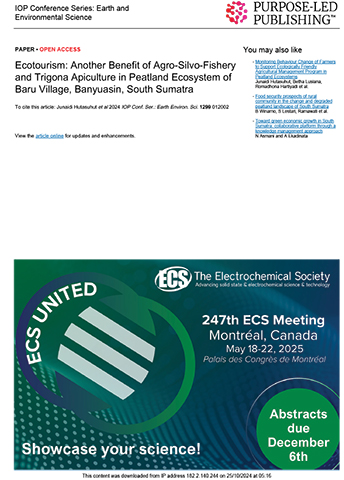
| Title: | Ecotourism: Another Benefit of Agro-Silvo-Fishery and Trigona Apiculture in Peatland Ecosystem of Baru Village, Banyuasin, South Sumatra |
| Author: | Junaidi Hutasuhut, Thifali Adzani, Ade Oktariansyah Pratama, Cecilia Yulita Novia, David Susanto, Iskak Nungki Ismawan, Rizki Ary Fambayun, Romadhona Hartiyadi, Subekti Rahayu and Suyanto |
| Year: | 2023 |
| Call Number: | PP00334-23 |
Abstract: |
|||||||
Agro-silvo-fishery and Trigona apiculture are two business models developed in the peatland ecosystem in Baru Village, Banyuasin District, South Sumatra. Since the beginning of 2022, two demo plots have been built in the same village landscape as part of the business model implementation. The system's agro-silvo-fishery was established by constructing a pond around a paddy field and planting betelnut, vegetables, and fruit trees. Local fish that had acclimated to the acidic peatland habitat were captured during the flooding and raised in the ponds. In the constrained biophysical and chemical conditions of swampy terrain, this method is thought to be the greatest way to provide a variety of revenue. Individual farmers cannot afford the costs associated with setting up this system, especially when it comes to constructing the pond and dykes. Individual farmers cannot afford the costs associated with establishing this system, especially when it comes to constructing the pond and dykes. Hence, support from the district and village government and program partners is valuable. The farmer group harvested corn and vegetables from the dykes and rice from the paddy fields in the first year, and fish were not ready for harvest. However, the local BUMDes saved the day by creating weekly regular fishing activities and competition events, generating revenue from tickets. Moreover, the Trigona apiculture became a popular place for those outside the village to learn free of charge. Based on profitability analysis, the NPV of establishing agro-silvo-fishery is Rp103.036.769 per 0.8 ha for 30 years, with additional income from ecotourism is estimated to reach Rp21.600.000 per year. The established demonstration plot has the potential to become an ecotourism destination, and the key is to maintain the surrounding flowers and plants as the source of food for bees and the water condition for the fish. |
|||||||
File: |
|||||||
|
|||||||

